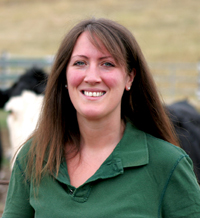
The Washington State University researcher, who brought facts and widespread attention to the declining size of the carbon footprint of the dairy industry in the U.S., will return to her native home of England in March.
Judith Capper (pictured) came to the U.S. in 2007 to do a postdoctoral study at Cornell University on lipid metabolism. Her focus quickly shifted, however, to measuring the environmental impact of a total dairy production system. She joined the WSU faculty as an assistant professor of dairy science in 2009.
Her research used hard facts to counter negative public perception about cows' contribution to global warming. Among them, that advances in feeding, breeding, and dairy management since 1944 have reduced the carbon footprint of producing a gallon of milk by two-thirds. Another is that, in terms of cheese production, Jersey cows have a 20 percent smaller carbon footprint than Holsteins.
Capper has accepted a position as senior manager of research and development at DairyCo, the check-off organization for the dairy industry in the United Kingdom that is equivalent to Dairy Management, Inc., in the U.S. Her last day at WSU will be February 29.
"The opportunity to work with dairy producers in the U.S. of all sizes, from 50 cows to 10,000, has been a fabulous experience," she said. "It made me much more aware of how important it is to look at everything in a production system, not just one or two specific bits. It's an experience that has changed me and will definitely help me in my new position."







